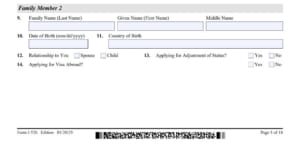 A Form I-130A is a supplemental form that is submitted with a Form I-130 Petition for Alien Relative and supplemental documentation to the United States Citizenship and Immigration Services (USCIS). A Form I-130A is only included when a U.S. Citizen or Lawful Permanent Resident (Green Card Holder) is petitioning his or her foreign spouse. A Form I-130A is not required for all other Form I-130 filings (i.e. parents and children).
A Form I-130A is a supplemental form that is submitted with a Form I-130 Petition for Alien Relative and supplemental documentation to the United States Citizenship and Immigration Services (USCIS). A Form I-130A is only included when a U.S. Citizen or Lawful Permanent Resident (Green Card Holder) is petitioning his or her foreign spouse. A Form I-130A is not required for all other Form I-130 filings (i.e. parents and children).
The I-130A asks specific information related to the foreign spouse. This includes the names, place
of birth, and birth dates of his or her parents; previous and current addresses, previous marriages (if any); and other questions which the foreign spouse must answer truthfully.
Once completed and submitted with the accompanying Form I-130 documentation, USCIS will commence processing. If USCIS determines that any additional information is needed, the agency will send out a Request for Evidence also known as an RFE.
For more information or questions concerning a Form I-130A, contact an immigration attorney for further assistance.




